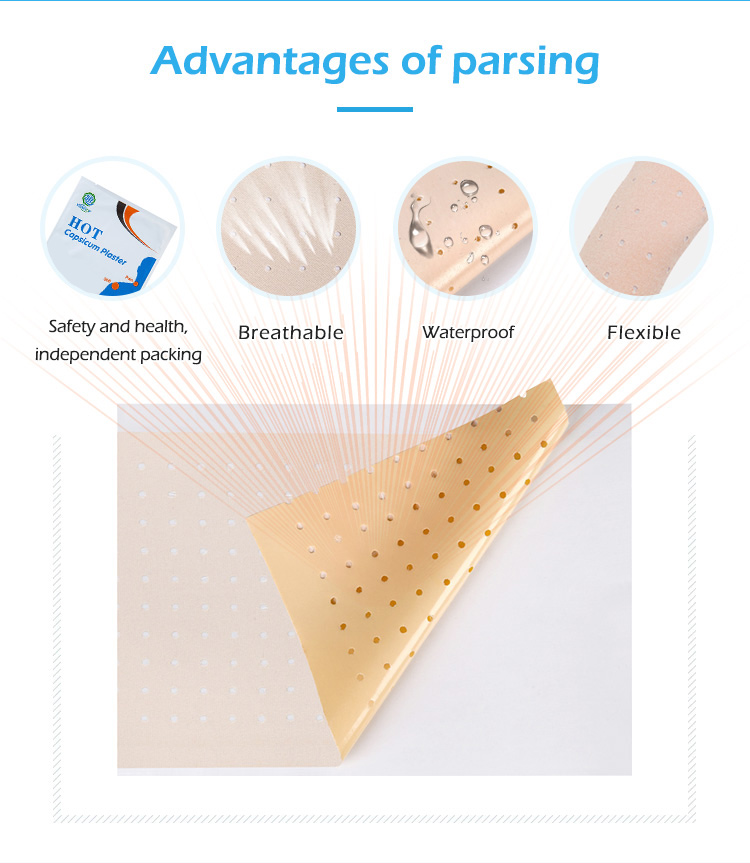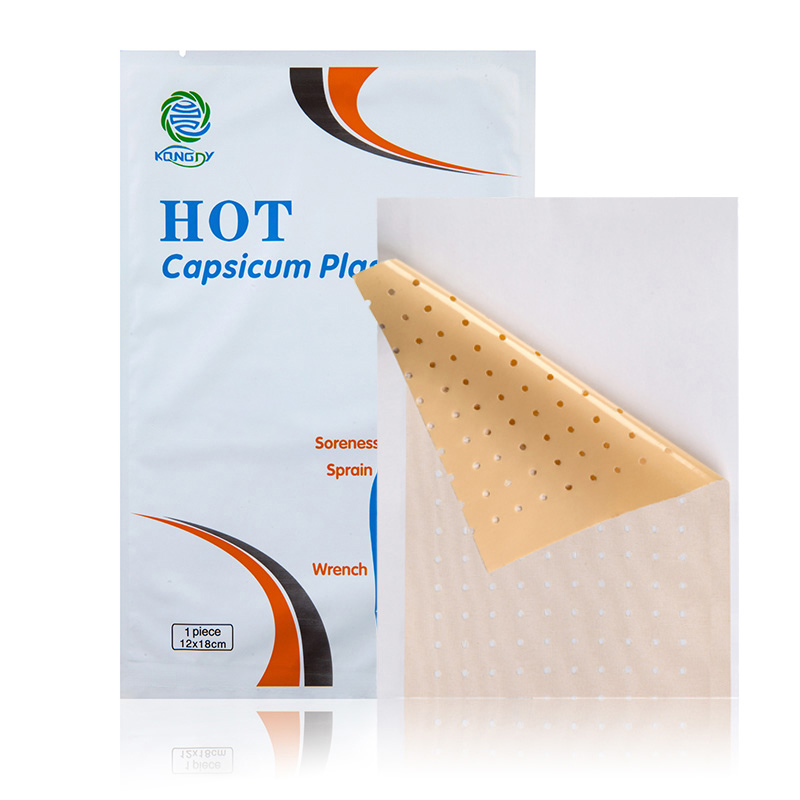Can I Sell My Private Label Capsicum Plaster Internationally?
As the demand for natural, topical pain relief grows worldwide, capsicum pain relief plasters have become increasingly popular. Whether you're a health product startup or an established wellness brand, the idea of selling your private label capsicum plaster internationally is both exciting and full of potential.
But can you actually sell your custom capsicum pain relief plasters in the global market? The answer is yes—if you’re well-prepared. With the right Capsicum Pain Relief Plaster Manufacturer, proper compliance, and smart branding, your international expansion can be a smooth and lucrative journey.
In this article, we’ll walk you through the essential steps, regulations, and strategic insights needed to successfully sell your Private Label Capsicum Pain Relief Plaster across international markets.

1. Understanding What a Private Label Capsicum Plaster Is
A Private Label Capsicum Pain Relief Plaster is a topical patch made with capsaicin (from chili pepper) that is manufactured by a third party but branded and sold under your company’s name. This arrangement is especially popular with brands that:
Want to launch a product quickly without setting up their own factory.
Prefer focusing on branding, sales, and marketing.
Seek to work with an experienced Capsicum Pain Relief Plaster OEM.
The key is to collaborate with a reliable Capsicum Pain Relief Plaster Supplier that offers customization and regulatory compliance support for international sales.
2. Is It Legal to Sell Capsicum Plasters Internationally?
Yes, you can legally sell private label capsicum plasters internationally—but compliance is essential. International sales require you to meet the regulatory and documentation standards of each country you plan to enter.
Key Factors to Consider:
Ingredient Compliance: Capsaicin concentrations must meet regional safety standards.
Labeling Requirements: Some countries mandate labeling in the local language, include dosage instructions, and highlight allergen warnings.
Certifications: You may need GMP, ISO, CE, or FDA certifications depending on your target market.
Import Restrictions: Certain countries may classify capsicum plasters as medical devices, cosmetics, or over-the-counter drugs.
A reputable Capsicum Pain Relief Plaster Manufacturer will often provide guidance or documentation that supports international registration.
3. Choosing the Right Capsicum Pain Relief Plaster Manufacturer
International expansion starts with choosing a capable Capsicum Pain Relief Plaster OEM partner. Not all manufacturers are equipped to support private label businesses that want to sell globally.
What to Look For:
Global Export Experience: Has the manufacturer supplied products to the U.S., EU, Southeast Asia, etc.?
Regulatory Support: Can they assist with product registration in target countries?
Custom Formulations: Do they offer options for custom capsicum pain relief plasters with different sizes, adhesive types, or herbal infusions?
Language and Packaging Support: Do they support multi-language packaging or country-specific designs?
The right Capsicum Pain Relief Plaster Supplier is more than a contract manufacturer—they’re a strategic partner in your brand’s global journey.
4. Preparing Your Product for Global Markets
To sell your Private Label Capsicum Pain Relief Plaster internationally, your product must be adapted to each market’s expectations. Here’s how to get started:
a) Customize Your Product
Use your Capsicum Pain Relief Plaster OEM to create tailored versions of your plaster:
Adjust active ingredient concentrations based on regulatory limits.
Offer various patch sizes for regional preferences (e.g., back patches, knee plasters, etc.).
Add herbal components (e.g., menthol, camphor, arnica) to differentiate your formula.
b) Packaging Localization
Work with your Custom Capsicum Pain Relief Plaster supplier to design packaging that is:
Translated into local languages.
Compliant with legal requirements (e.g., barcode, expiry date, dosage).
Branded to appeal to local consumer trends.
c) Understand Distribution Channels
Determine if you will:
Sell through eCommerce (Amazon, Shopify, Lazada).
Partner with local distributors or clinics.
Sell through OTC retail chains or pharmacies.
Your Capsicum Pain Relief Plaster Manufacturer can often help you prepare packaging for retail or bulk formats, depending on the channel.
5. Certifications and Documentation You’ll Likely Need
To enter international markets legally, you’ll need documentation—some provided by your OEM Capsicum Plaster Manufacturer, others you may need to apply for:
| Market | Likely Required Certification/Documentation |
|---|---|
| USA | FDA OTC Drug Monograph Compliance, NDC |
| EU | CE Mark (MDR), ISO 13485 |
| Southeast Asia | ASEAN Cosmetic Directive or Medical Device Approval |
| Middle East | SFDA or similar health authority approval |
Your Capsicum Pain Relief Plaster OEM partner should help provide:
Certificate of Analysis (COA)
GMP/ISO documentation
MSDS (Material Safety Data Sheet)
Product specification sheets
Ingredient list
These are critical for customs clearance and retail compliance.
6. Marketing Your Private Label Capsicum Plasters Globally
Once your product is compliant and ready to ship, you must tailor your marketing message for each audience.
Key Marketing Considerations:
Highlight natural ingredients like capsaicin, menthol, and herbal extracts.
Educate about benefits: Fast pain relief, anti-inflammatory effects, ease of use.
Address local pain points: Target joint pain, arthritis, sports injury, or back pain depending on the region.
Your Custom Capsicum Pain Relief Plaster is more likely to succeed if your messaging resonates with cultural and health concerns in your target country.
7. Logistics and International Fulfillment
You’ll need to manage:
Export licenses
Shipping and customs clearance
Last-mile delivery
Warehousing or drop-shipping models
Some Capsicum Pain Relief Plaster Suppliers offer export-ready solutions and even partner with global logistics providers to simplify the process.
8. Common Challenges (and How to Overcome Them)
| Challenge | Solution |
|---|---|
| Regulatory differences between countries | Work with an experienced Capsicum Pain Relief Plaster OEM that offers regulatory support. |
| High MOQs (Minimum Order Quantities) | Negotiate with your Capsicum Pain Relief Plaster Manufacturer for smaller pilot runs. |
| Language barriers in labeling and communication | Use multi-language packaging and hire native speakers for copywriting. |
| Slow time-to-market | Start with markets that have simpler regulatory pathways (e.g., Southeast Asia before EU). |
Conclusion
Yes, you absolutely can sell your Private Label Capsicum Pain Relief Plasters internationally—and it can be a highly profitable move. The key is to work with a seasoned Capsicum Pain Relief Plaster Manufacturer who understands global compliance, offers high-quality products, and supports your brand through OEM customization.
By tailoring your product, packaging, and strategy to each market—and ensuring you meet all regulatory requirements—you position your brand for long-term success.
If you are ready to scale globally, find a Capsicum Pain Relief Plaster Supplier who can help you go from concept to international shelf with confidence.
Related Questions and Short Answers
1. What are the first steps to selling my private label capsicum plaster internationally?
Start by choosing a reliable Capsicum Pain Relief Plaster OEM, ensuring your product meets the regulations of the target country, and customizing packaging and formula accordingly.
2. What certifications do I need to export capsicum plasters?
It depends on the country. Common ones include FDA registration (USA), CE Mark (EU), and GMP/ISO documents from your Capsicum Pain Relief Plaster Manufacturer.
3. Can a Capsicum Pain Relief Plaster Supplier help with documentation?
Yes, many OEM manufacturers provide export documentation such as COA, MSDS, and ingredient specs to help with registration and customs.
4. How do I customize capsicum plasters for different countries?
Work with a Custom Capsicum Pain Relief Plaster OEM to modify active ingredients, adjust patch size, and localize packaging in the appropriate language.
5. What’s the difference between OEM and private label in this context?
OEM refers to the manufacturing process where you customize the formula; private label refers to the branding and sale of that product under your brand.






